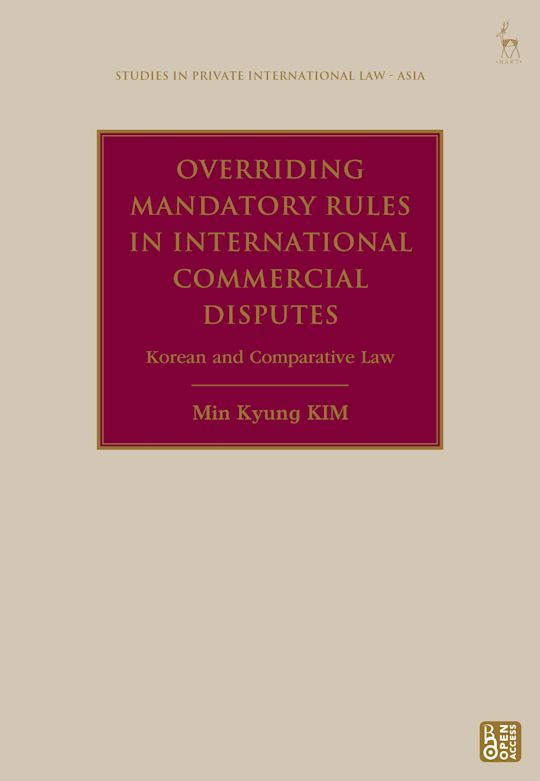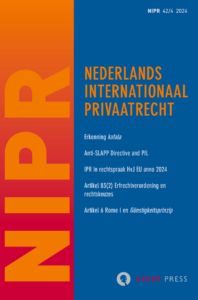Views
International high-tech surrogacy and legal developments in the Netherlands
This blogpost is an edited version of this blogpost written in Dutch by Stichting IJI (The Hague Institute for private international law and foreign law). We thought it was interesting to also bring it to the attention of the international readership of this blog.
Introduction
In the Netherlands, international high-tech surrogacy is a hot topic, resulting in interesting legal developments. Recently, a Dutch District Court dealt with a case on the recognition of US court decisions on legal parenthood over children born from a high-tech surrogacy trajectory in the US, providing many private international law insights on how to assess such request for recognition. Furthermore, on July 4 a bill was proposed that encloses several private international law provisions. This blogpost briefly highlights both developments.
Same-sex relationships concluded abroad in Namibia – Between (Limited) Judicial Recognition and Legislative Rejection
There is no doubt that the issue of same-sex marriage is highly controversial. This is true for both liberal and conservative societies, especially when the same-sex union to be formed involves parties from different countries. Liberal societies may be tempted to open up access to same-sex marriage to all, especially when their citizens are involved and regardless of whether the same-sex marriage is permitted under the personal law of the other foreign party. For conservative societies, the challenge is even greater, as local authorities may have to decide whether or not to recognise same-sex marriages contracted abroad (in particular when their nationals are involved). The issue becomes even more complicated in countries where domestic law is hostile to, or even criminalises, same-sex relationships.
Cassirer on Remand: Considering the Laws of Other Interested States
This post is by Carlos Manuel Vázquez, a professor of law at Georgetown Law School. It is cross-posted at Transnational Litigation Blog.
Claude Cassirer brought suit in federal court in California eighteen years ago against the Thyssen Bornemisza Museum of Madrid, Spain, to recover a painting by Camille Pissarro that was stolen from his grandmother by the Nazis during World War II. After a reversal and remand from the U.S. Supreme Court last summer, the case is now before the Ninth Circuit for decision of the legal question that is likely to be decisive: which law governs?
The district court and the court of appeals have so far framed the issue as a binary choice: the governing law on the merits is either that of Spain or that of California. I suggest here that the issue is better framed as a choice between the law of Spain, on the one hand, and the laws of all the other states or countries with connections to the dispute, on the other. (Disclosure: I submitted expert declarations in support of the plaintiffs on issues of public international law during earlier phases of this case.)
The U.S. Court of Appeals for the Ninth Circuit has affirmed the district court’s holding that, under the law of Spain, the plaintiff loses because the museum acquired title to the painting through adverse possession (otherwise known as acquisitive prescription). It is equally clear that, under the law of California, the plaintiff would prevail because California does not recognize the acquisition of title to moveable property through adverse possession. What has so far not featured prominently in the courts’ analyses of the choice-of-law issue is that the plaintiff would also prevail under the laws of all the other jurisdictions that have relevant connections to the dispute. Under governmental interest analysis, this should be central to the analysis. Read more
News
ILA Committee on Conflict-of-Laws Issues in International Arbitration: First Webinar on 18 February 2025
This post was written by Lukas Petschning, University of Vienna.
Conflict of laws is one of the most complex and disputed subject areas in international arbitration. An abundance of academic works has examined the issue and proposed widely diverging solutions. Yet, these studies frequently focus on isolated issues and lack overall consistency. Equally, they are often overly theoretical, lacking practical guidance useful to the average arbitrator or judge.
Forging a path toward more legal certainty, the International Law Association has established a new Committee on Conflict-of-Laws Issues in International Arbitration. It is chaired by Dr Nikolaus Pitkowitz and Ms Wendy Lin, with Professor Matthias Lehmann and Dr Mariel Dimsey acting as co-rapporteurs.
Out Now: Kim, Overriding Mandatory Rules in International Commercial Disputes [Open Access]
As part of Hart’s Studies in Private International Law – Asia, Min Kyung Kim, Judge at the Incheon District Court in Korea, just published her new book on Overriding Mandatory Rules in International Commercial Disputes: Korean and Comparative Law.
The impressive monograph, just shy of 200 pages, takes a comprehensive look at the role of overriding mandatory rules in international commercial litigation and arbitration, using Korea as a vantage point. It takes a close look at a large variety of (mainly European) sources in order to interpret and critically discuss the Korean Act on Private International Law, with a particular focus on the treatment of third-country mandatory rules. The book also identifies a range of potentially overriding mandatory provisions in Korean law.
The book is available open access at the publisher’s website.
Dutch Journal of PIL (NIPR) – issue 2024/4
The latest issue of the Dutch Journal on Private International Law (NIPR) has been published.
EDITORIAL
M.H. ten Wolde / p. 626-628
ARTICLES
A. Mens, De kwalificatie en de rechtsgevolgen van de erkenning van een kafala op grond van het Nederlandse internationaal privaatrecht/ p. 628-649
Abstract
This article focuses on the qualification and legal consequences of recognising a kafala under Dutch private international law. A kafala is a child protection measure under Islamic law, which entails an obligation to care for, protect, raise, and support a child, but without any implications for lineage or inheritance rights. The main conclusion is that a kafala generally constitutes both a guardianship and a maintenance decision. Consequently, the recognition of a foreign kafala in the Netherlands essentially entails the recognition of both the guardian’s (kafil) authority over the child (makful) and the recognition of the guardian’s maintenance obligation towards the child.
B. van Houtert, The Anti-SLAPP Directive in the context of EU and Dutch private international law: improvements and (remaining) challenges to protect SLAPP targets / p. 651-673
Abstract
Read more



